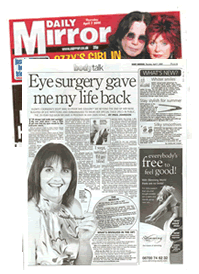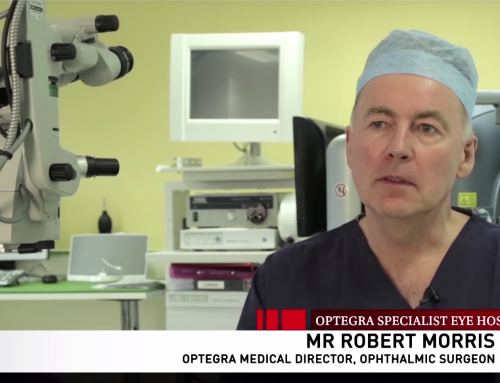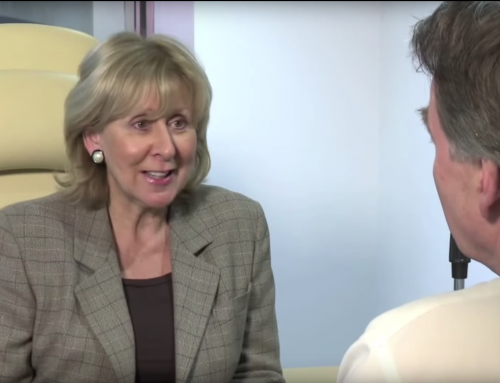 Eye surgery gave me my life back
Eye surgery gave me my life back
Glenys Cookman’s sight was so poor she couldn’t see beyond the end of her nose. Blighted by eye infections and embarrassed to wear her special thick specs in public, the 35-year-old mum became a prisoner in her own home.
By Paul Johnson.
I’ve always had really bad eyesight. My one wish since I was a little girl was that my eyes would be like everyone else’s.
But at school I had to wear really thick glasses and got teased about it a lot – I felt like a real ugly duckling.
I had contact lenses when I was 16. They were great because no-one knew how bad my sight was. But they were expensive – £200 – because they had to be specially made. Most people who are short-sighted have a prescription of minus 2 or minus 3. Mine was minus 23.
About three years ago, my lifetime of contact lens use caught up with me and I started suffering from really bad eye infections. It felt like there was a piece of grit permanently stuck in my eye.
I work as a dinner lady at a local school and I would drive into work wearing contact lenses and then take them out during the day because they were so uncomfortable.
Eventually last summer the pain got so bad – like needles in my eyeball – that I couldn’t wear contact lenses at all.
The only alternative was to wear special glasses, which cost £700 to be tailor-made. They had extremely thick lenses, like milk bottle bottoms, because they were so strong.
The glasses made me look terrible, with little piggy eyes, and I couldn’t bring myself to go out in them.
I’d wear them at home in front of my partner Paul and children Rachel and Cara, but I wouldn’t answer the front door.
To hide my eyes when I went out, I used clip-on dark shades on the glasses. This worked during the day, although people often gave me a funny look. But in the evening the glasses were just too dark to see properly, so I stayed in. I was effectively a prisoner in my own home. I didn’t allow anyone inside the house. I didn’t even let my sister see me in the glasses without the shades on. I never went out or socialised in the evening. The kids couldn’t have their friends over, either.
I once walked into a fridge door, denting my glasses and giving myself a black eye, and had to be signed off work sick.
Some days, I’d just sit and weep. I was terrified I’d go blind as my eyesight became steadily worse.
I went to see my optician, desperate for a solution, and he suggested I talk to a consultant ophthalmologist he knew.
The surgeon, Rob Morris, who runs Grange Eye Consultants, said I was one of the most serious cases of short-sightedness he had ever seen. He recommended surgery in which a contact lens would be implanted into my eye. But he couldn’t guarantee how much sight would be restored.
The surgery was straightforward – it took 15 minutes for each eye. As I had a local anaesthetic I was awake and didn’t feel a thing.
As soon as I sat up in the operating theatre after the first operation, the whole room came into focus and I could see Mr Morris’s face. It was like a miracle.
My eyes were a bit red, but cleared up the next day. And two days after the last operation I was back driving a car again – without glasses. It cost £4,400 to have both eyes done, but it’s the best investment I’ve ever made. You can’t put a price on your eyesight.
Now I have better vision than I have ever had in my whole life. It’s very hard to explain to people just how amazing this is.
Everything looks different now because I can see things in so much more detail and colour. The operation has transformed my life.
THE RESULTS
Mr Rob Morris, who is also an NHS consultant, is the eye surgeon who operated on Glenys.
‘Glenys’ eyesight was very unusual – very few people have a prescription of
-23’, he says. ‘The thinness of her cornea meant she wasn’t suitable for laser surgery to correct her vision.
Even I was surprised by the transformation in her sight after the operation. It’s very satisfying to have such a great result.
Glenys is now 6/6 in one eye – the best one – and 6/9 in the other. This means that in the poorer eye she can see at six metres what the average person can see at nine metres. It’s not a problem, though, and she can still drive without glasses.’
WHAT’S INVOLVED IN THE OP?
Implantable contact lens (ICL) surgery uses lenses similar to normal contact lenses – except they are inserted inside the eye itself. This means it works with the eye’s own lens to properly focus light on the retina.
It is intended to be a permanent implant that should last a lifetime but it can be reversed and the lens removed.
Who is it suitable for?
ICL is most effective for patients who suffer from extreme levels of poor vision or have thin corneas, making them unsuitable for laser eye surgery.
What are the risks?
The risks are minimal but can include infections and the very small chance of triggering a cataract due to the delicate nature of the operation.
Grange Eye Consultants can treat a number of eyesight problems and work from clinics in Hampshire and Somerset. For more info, call 02380 258417 or visit www.grangeeyeconsultants.com
DAILY MIRROR- 7 APRIL 2005




